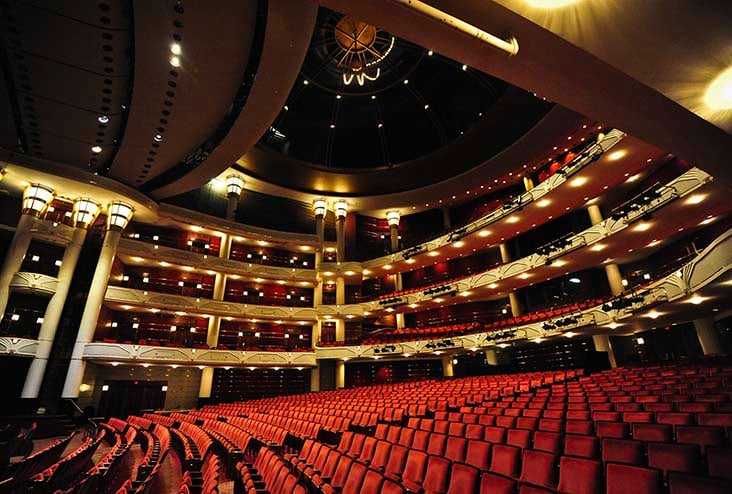“I shall be Hebe, who pours,” exclaims Violetta, the tragic heroine of Giuseppe Verdi’s best-known opera La Traviata in its frenzied first act party scene. In Palm Beach Opera’s February 2025 production, the luminous soprano Gabriella Reyes channeled the Greek goddess of youth and cupbearer of the gods by pouring generous amounts of Veuve Clicquot champagne, stacked cases of which greet shoppers at our beautiful island resort community’s Publix supermarket.
Like Violetta, we in the audience had much to celebrate. Palm Beach Opera’s general director James Barbato welcomed the audience with the news that La Traviata nearly sold out, making it the highest selling production in the company’s history, with receipts rising 10 percent over the record set last season by its stellar production of Giacomo Puccini’s Tosca. Like Reyes, who was performing her role for the first time, the superb leading tenor Mario Chang and stentorian baritone Michael Chioldi stand at the top of their profession. All three have performed at New York’s now struggling Metropolitan Opera, which, pandemic years excepted, is currently staging its smallest number of productions since 1980-1981, when a prolonged strike delayed the season by several months.
Earlier this month, Palm Beach Opera’s annual gala at the town’s historic Breakers resort featured a recital by the superstar Russian soprano Anna Netrebko, who has suffered under a de facto ban from less enlightened North American theaters because she failed to denounce Russian President Vladimir Putin over the war in Ukraine. Netrebko has denounced the war itself—to the point that she is ironically banned from performance in Russia as well—but as a Russian citizen she could theoretically face a lengthy prison sentence if she criticized her government or its leader.
In Palm Beach, however, it is the art, not politics, which matter. The gala drew a small protest by pro-Ukrainian activists but nevertheless was a smashing success. Followed by a sumptuous dinner, it sold out for the first time in the event’s history, with a starting ticket price of $1,250 and waitlist of over 100. Recently, Palm Beach Opera has received record charitable donations, conducted impressive community outreach, and operated one of the world’s most selective young artist programs. This season, the company announced high-value naming gifts for Barbato’s position and for that of music director David Stern, who led a lively but contemplative performance of La Traviata.
Clearly, the arts are working in Palm Beach. The opera program’s tasteful and well-cast productions of popular works resonate with audiences who are grateful and generous. Perhaps unsurprisingly, many of those who attend are former New Yorkers who often profess fatigue with the Met’s recent focus on “new works” featuring “relevant” (i.e. woke) social themes, which, according to recently released figures, have been financial as well as critical disappointments. Veronica Atkins, who chaired the gala featuring Netrebko and is a lifetime grand patron of Palm Beach Opera, also sits on the board of the Met, whose general manager Peter Gelb criticized the Russian soprano’s engagement here as “an unfortunate decision.” Frayda Lindemann, a president emerita of the Met’s board who, along with her late husband George, donated to the Met a major naming gift for its young artist program, has also supported the Palm Beach Opera and the Netrebko gala.
Does all this require government sponsorship? Not at all. Last year, Florida Governor Ron DeSantis vetoed a proposed $32 million state arts budget appropriation in its entirety, claiming that too much of the money was dedicated to pushing radical gender ideology, sexualized content, and diversity, equity, and inclusion (DEI) initiatives, which are widely believed to be discriminatory and are legally prohibited in Florida state institutions. This was only a small portion of the $950 million DeSantis trimmed from the state’s $116.5 billion 2025 budget using his line-item veto power, but many arts organizations claimed to have been hurt by it. Palm Beach Opera was reportedly deprived of $150,000, according to the Palm Beach Post. Its massive success this season, however, suggests that it is doing just fine under judicious, audience-centered leadership that refuses to give in to cancel culture and the asinine political correctness to which too many less-deserving institutions have succumbed.
This year, DeSantis is talking about restoring $27 million in arts funding to the state budget, subject to greater supervision about how the money is spent, including set asides for historic preservation and celebrations of America’s 250th anniversary in 2026. Floridians everywhere should hope the restored funds will benefit Palm Beach Opera, which succeeds in its mission of “producing live opera at an international standard of excellence.” Its website includes no diversity statement.

Leave a Reply